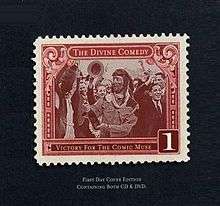Victory for the Comic Muse
| Victory for the Comic Muse | ||||
|---|---|---|---|---|
 | ||||
| Studio album by The Divine Comedy | ||||
| Released | 19 June 2006 | |||
| Recorded | December 2005 | |||
| Genre | Orchestral pop | |||
| Length | 44:34 | |||
| Label | Parlophone | |||
| Producer | Neil Hannon | |||
| The Divine Comedy chronology | ||||
| ||||
| Singles from Victory for the Comic Muse | ||||
|
||||
| CD+DVD version cover | ||||
 |
||||
| Professional ratings | |
|---|---|
| Review scores | |
| Source | Rating |
| AllMusic | |
| The Guardian | |
| musicOMH | |
| Pitchfork Media | (7.5/10)[4] |
| Scotland on Sunday | (positive)[5] |
Victory for the Comic Muse is the ninth studio album by The Divine Comedy. It was released by EMI on 19 June 2006. Neil Hannon did not choose the title as a reference to the group's 1990 debut Fanfare for the Comic Muse. It's actually a quote from the book "A Room with a View" ("I have won a great victory for the comic muse").[6]
On 28 February 2007, Victory for the Comic Muse won the Choice Music Prize at a ceremony that took place in Dublin's Vicar St. venue. The Choice Music Prize is Ireland's equivalent to the Mercury Music Prize. The judging panel was made up of 12 representatives from the Irish music industry. The prize consisted of a trophy as well as a cheque for €10,000. The Divine Comedy's victory was unexpected as the album had received some lukewarm reviews and there was strong competition from the likes of The Immediate, Duke Special and Snow Patrol.
A special edition version of the album, officially available only on the first day of release, came with second DVD and an additional cardboard sleeve.
Recording
The album is unique in the Divine Comedy catalogue - and in the catalogue of most recent popular music - in that Hannon's original aim with the album was to record it entirely in two weeks, with the minimum of overdubbing. As such, almost all of the music on the album - much to the chagrin of the classical players involved on almost every track, and the Divine Comedy band itself - was recorded in live takes. At first, they attempted to use no click tracks or headphones, but eventually they did. The band would record their part, the orchestra would overdub theirs, and then Hannon would record his vocals. No further overdubbing took place unless absolutely necessary, in a fairly hurried style of recording, and in stark contrast to the modern recording technique of stacking up tracks.
During the recording, Hannon's vocals had to be recorded even more hurriedly than planned because for most of the two weeks he was suffering from a cold that got progressively worse before finally clearing up.
Track listing
All songs written by Neil Hannon except where noted.
- "To Die a Virgin" – 3:39
- "Mother Dear" – 3:47
- "Diva Lady" – 4:17
- "A Lady of a Certain Age" – 5:47
- "The Light of Day" – 4:24
- "Threesome" – 1:10
- "Party Fears Two" – 4:02 (Billy Mackenzie, Alan Rankine)
- Originally recorded by Associates
- "Arthur C. Clarke's Mysterious World" – 3:58
- "The Plough" – 5:14
- "Count Grassi's Passage Over Piedmont" – 3:32
- "Snowball in Negative" – 4:40
- "Premonition of Love" – 3:54 (Bonus Track for Japan)
- "Births, Deaths & Marriages" – 4:11 (Bonus Track for Japan)
Personnel
- Dougie Payne, bassist with Travis, features on several tracks.
Cultural references
- Arthur C. Clarke's Mysterious World is a reference to the 80s television show of the same name
- The sample at the beginning of To Die A Virgin is of Jennifer Ehle and Toby Stephens in the 1992 TV series The Camomile Lawn.
References
- ↑ Victory for the Comic Muse at AllMusic
- ↑ The Guardian
- ↑ musicOMH Archived 24 April 2010 at the Wayback Machine.
- ↑ Pitchfork Media
- ↑ Scotland on Sunday
- ↑ "::Interview :: The Divine Comedy (Neil Hannon) : 14/10/2006". Obskure.com. 2006-10-14. Retrieved 2012-03-13.